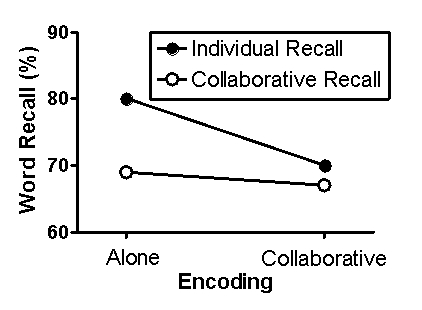Exam 6: Memory
Exam 1: Psychology: Evolution of a Science456 Questions
Exam 2: Methods in Psychology400 Questions
Exam 3: Neuroscience and Behavior588 Questions
Exam 4: Sensation and Perception551 Questions
Exam 5: Consciousness406 Questions
Exam 6: Memory484 Questions
Exam 7: Learning469 Questions
Exam 8: Emotion and Motivation363 Questions
Exam 9: Language and Thought390 Questions
Exam 10: Intelligence317 Questions
Exam 11: Development382 Questions
Exam 12: Personality368 Questions
Exam 13: Social Psychology360 Questions
Exam 14: Stress and Health311 Questions
Exam 15: Psychological Disorders372 Questions
Exam 16: Treatment of Psychological Disorders339 Questions
Exam 17: Integrative Questions211 Questions
Select questions type
Eric Kandel won the Nobel Prize by demonstrating long-term memory in the Aplysia,a one-celled organism.
(True/False)
4.8/5  (40)
(40)
At the supermarket,Charlotte finds it much easier to remember the food items she needs when she puts them into the categories of fruits,vegetables,and meat.What encoding process is Charlotte using to create and recall memories?
(Multiple Choice)
4.9/5  (38)
(38)
Chad recalls that Jack the Ripper was a serial killer who terrorized London in 1888,but he has no idea if he originally learned this information from a book,a television show,a movie,or a story from another person.Chad is experiencing a failure of _____ memory.
(Multiple Choice)
4.9/5  (36)
(36)
Use the following to answer questions :
Scenario I
The scenario is based on and presents fabricated data consistent with the following study:
Barber,S.J. ,Rajaram,S. ,& Fox,E.B.(2012).Learning and remembering with others: The key role of retrieval in shaping group recall and collective memory.Social Cognition,30(1),121-132.doi:10.1521/soco.2012.30.1.121
In a typical experiment on collaborative memory,participants first encode information individually and later attempt to recall the information either individually or in a small group (collaboratively).While the recall of the collaborative group is better than that of any individual,the summed recall of individuals typically is better than the recall of the collaborative group.This is a phenomenon termed collaborative inhibition.Barber,Rajaram,and Fox (2012)investigated this phenomenon during both the encoding and retrieval stages of memory.
Participants created sentences out of a word bank,which provided for the opportunity to encode this information.After completing this task,participants engaged in an unrelated task-solving mazes-for 10 minutes.Then,in a surprise memory test,they were asked to recall as many words from the word bank as possible (retrieval).
Participants were randomly assigned to one of four groups.In the first group (Alone-Alone),participants were studied individually during both the encoding and retrieval phases of the experiment.In the second group (Alone-Collaborative),participants were studied individually during the encoding phase and as part of a three-member team (triad)during the retrieval phase.In the third group (Collaborative-Alone),participants were studied in a triad during the encoding phase but individually during the retrieval phase.Finally,in the fourth group (Collaborative-Collaborative),participants completed both phases of the experiment as part of a triad.
Fabricated results illustrating the major finding of Barber et al.(2012)are presented in Figure 6.1.This figure shows the percentage of words from the word bank accurately recalled as a function of group.For the two groups that experienced the retrieval phase individually,scores represent the summed retrieval of the individuals comprising the group.For the two groups that experienced the retrieval phase as part of a triad,scores simply represent the collaborative performance.
Figure 6.1  -(Scenario I)Some degree of collaborative inhibition was observed:
-(Scenario I)Some degree of collaborative inhibition was observed:
(Multiple Choice)
4.9/5  (39)
(39)
A waitress' brain is studied in an fMRI while she mentally engages in remembering the food and drink orders for a table of six virtual people.Most likely,the MRI will reveal which area of the frontal lobe to be the MOST active?
(Multiple Choice)
4.7/5  (29)
(29)
Your friend tells you her phone number.Hearing,thinking about,and translating the phone number to place it in your memory is an example of which process?
(Multiple Choice)
4.9/5  (44)
(44)
Sleep aids in memory by facilitating the consolidation of important-but not unimportant-information.
(True/False)
4.8/5  (39)
(39)
Absentmindedness often involves a failure of _____ memory.
(Multiple Choice)
4.8/5  (45)
(45)
Hermann Ebbinghaus first described how information in long-term memory is forgotten with the passage of time.
(True/False)
4.9/5  (34)
(34)
Remembering how to ride your bike is an example of _____ memory.
(Multiple Choice)
4.9/5  (37)
(37)
According to transfer-appropriate processing,we are more likely to recall information when:
(Multiple Choice)
4.9/5  (35)
(35)
Flashbulb memories are more vivid but are forgotten more easily than are ordinary memories.
(True/False)
4.8/5  (42)
(42)
When learning a new word,like amygdala,Angie will remember it BEST if she:
(Multiple Choice)
4.8/5  (50)
(50)
In a typical collaborative memory experiment,participants who first encode a list of words by themselves and later attempt to recall those words individually form what is called the _____ group.
(Multiple Choice)
4.9/5  (46)
(46)
Transience describes how our memories _____ details over time as stored memories become more _____.
(Multiple Choice)
4.8/5  (38)
(38)
Which statement accurately describes the results of a typical collaborative memory experiment?
(Multiple Choice)
4.8/5  (39)
(39)
Using social pressure,Shaw and Porter (2015)got _____% of the university students in their study to falsely remember committing a crime as adolescents.
(Multiple Choice)
4.9/5  (39)
(39)
Monique Roberts wanted to find a fun way to help her students prepare for their forthcoming history exam.She decided to create a game show with questions about different countries and their governments.Which type of memory would the students rely on to answer the questions?
(Multiple Choice)
4.9/5  (37)
(37)
Showing 181 - 200 of 484
Filters
- Essay(0)
- Multiple Choice(0)
- Short Answer(0)
- True False(0)
- Matching(0)